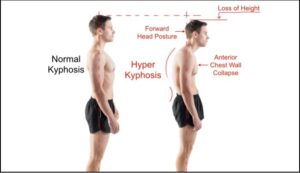

Let’s face it, the term “nerd neck” does not exactly scream sophistication, but it has become an all-too-common posture in our modern, tech-driven lives.
Nerd neck, or forward head posture (FHP), describes the habitual jutting of your head forward from its natural alignment, often due to excessive screen time.
Beyond the aches and pains associated with poor posture, there’s a growing body of evidence linking nerd neck to mental health issues like depression.
In this article, BestForwardHeadPostureFix researchers shall dive deep into the connection between nerd neck and depression.
From the physiological impacts on the body to how posture shapes mood and perception, we would explore the surprising ways your stance affects your state of mind.
We shall back this discussion with real-life examples and scientific studies, helping you understand why your posture might be dragging down more than just your shoulders.
Article Contents:
- What Is Nerd Neck and Why Does It Happen?
- How Nerd Neck Impacts Your Physical Health
- The Posture-Mood Connection: Why Nerd Neck May Lead to Depression
- Real-Life Example: Sarah’s Nerd Neck and Mental Health Struggles
- Scientific Studies Linking Posture to Depression
- Long-Term Consequences of Ignoring Nerd Neck
- FAQs on Tech Neck and Depression
- Conclusion: Why Addressing Nerd Neck Can Brighten Your Outlook
What Is Nerd Neck and Why Does It Happen?
Nerd neck, or forward head posture, occurs when the head juts forward from its natural alignment with the spine.
Picture someone hunched over their laptop, phone, or gaming console for hours on end—sound familiar?
Over time, this posture can become your default, throwing your musculoskeletal system out of whack.
The rise of technology has made nerd neck a common issue.
From endless Zoom calls to doom-scrolling social media, we are spending more time than ever looking down or forward at screens.
The strain on the neck and upper back leads to a domino effect, affecting both physical and mental well-being.
How Nerd Neck Impacts Your Physical Health?
Before diving into how nerd neck affects mental health, let’s first understand the physical toll it takes on your body.
This seemingly simple posture problem can wreak havoc in multiple ways:
- Muscle Imbalances: Nerd neck causes your head to jut forward, placing excessive strain on the neck, shoulders, and upper back. Over time, this leads to tightness in certain muscles, such as the upper trapezius and levator scapulae, while others, like the deep neck flexors, become weak and underutilized. This imbalance affects posture further, creating a vicious cycle of discomfort.
- Reduced Blood Flow: Forward head posture compresses vital blood vessels, particularly those supplying the brain and upper body. This restricted blood flow to the brain can limit the delivery of oxygen and nutrients, leaving you feeling fatigued and unfocused. Reduced circulation may also exacerbate tension headaches.
- Chronic Pain: Persistent neck and shoulder pain is a hallmark of nerd neck. Over time, this can lead to secondary issues like tension headaches or even migraines due to the strain placed on cervical nerves and muscles.
Key Insight: Constant physical discomfort does not stay confined to the body.
It often spills over into your emotional well-being, laying the foundation for mood disturbances—a connection we shall explore in the next section.
Addressing the physical effects of nerd neck is critical to breaking this cycle.
The Posture-Mood Connection: Why Nerd Neck May Lead to Depression?
Your posture is more than just a physical alignment—it profoundly influences your emotions and mental state.
Nerd neck, or forward head posture, is not just about neck pain; it can contribute to depressive tendencies in several ways:
1. Restricted Breathing
Nerd neck compresses the chest cavity, limiting lung expansion. This reduces lung capacity, leading to shallow breathing. The body relies on oxygen to fuel its systems, including the brain, and when oxygen levels drop, fatigue, irritability, and low mood often follow.
A study published in Frontiers in Psychology (2018) highlighted that poor oxygenation caused by shallow breathing is closely linked to symptoms of depression.
2. Altered Hormonal Balance
Posture affects the production of key hormones that regulate mood. When you slouch or adopt a forward-leaning posture, cortisol levels—the body’s stress hormone—tend to rise.
Simultaneously, serotonin, the neurotransmitter responsible for feelings of well-being, may decrease. This hormonal imbalance exacerbates stress and reduces the capacity for positive emotions, contributing to feelings of sadness and anxiety.
3. Negative Feedback Loop
Poor posture often triggers a self-perpetuating cycle. Nerd neck can make you feel less confident, leading to withdrawal from social interactions. This reinforces depressive tendencies.
A study published in Health Psychology (2017) found that simply adopting an upright posture significantly improved mood and energy levels, even in individuals experiencing mild depression.
In essence, the physical constraints caused by nerd neck ripple into your emotional well-being, illustrating just how interconnected posture and mental health truly are.
Neila’s Nerd Neck and Mental Health Struggles
Neila, a 27-year-old graphic designer, spent most of her day hunched over her laptop.
She started noticing persistent neck pain and fatigue, but it was not just physical—her mood took a hit too.
Neila felt increasingly anxious and disconnected, struggling to find motivation even for activities she once enjoyed.
A visit to her physiotherapist revealed the culprit: forward head posture. Her poor posture was not only causing physical discomfort but also contributing to her feelings of low energy and sadness.
After working on posture-correcting exercises and mindfulness techniques, Sarah reported feeling more confident, energetic, and even optimistic.
Neila’s journey illustrates how addressing nerd neck can positively impact both physical and mental health.
Scientific Studies Linking Posture to Depression
The connection between posture and mood is well-supported by a growing body of scientific research, demonstrating that how you carry yourself physically can have a profound effect on your mental well-being.
Here are three key studies that highlight this link:
1. “Posture and Mood: The Feedback Effect” (Health Psychology, 2017):
This study revealed that adopting an upright posture can significantly improve mood and self-esteem, even in participants experiencing mild depression. The researchers noted that upright posture not only made individuals feel more confident but also helped combat feelings of fatigue and negativity.
2. “Forward Head Posture and Quality of Life” (Journal of Physical Therapy Science, 2016):
This research emphasized the detrimental effects of forward head posture on mental well-being. The study found that individuals with forward head posture often experience reduced quality of life due to physical discomfort, such as chronic neck pain, and emotional challenges, including social withdrawal.
3. “Breathing Patterns and Emotional States” (Frontiers in Psychology, 2018):
This study highlighted how poor posture, particularly slouching or forward head posture, reduces lung capacity, leading to shallow breathing. This physiological limitation contributes to higher stress levels, increased anxiety, and a diminished ability to manage emotions effectively.
Together, these studies underscore that correcting posture isn’t just about appearance—it is a powerful, evidence-based approach to improving both physical comfort and mental health.
By addressing forward head posture, individuals can unlock significant benefits for their overall well-being.
Long-Term Consequences of Ignoring Nerd Neck
If left untreated, nerd neck is not just a temporary discomfort—it can set the stage for serious long-term consequences that impact both physical and mental health.
Here’s what can happen:
Chronic Pain:
The prolonged muscle imbalances caused by forward head posture put excessive strain on the neck, shoulders, and upper back.
Over time, this can lead to degenerative issues such as cervical spine arthritis, herniated discs, and nerve compression.
What starts as occasional discomfort can evolve into persistent, debilitating pain that limits daily activities and reduces quality of life.
Social Withdrawal:
Posture communicates confidence and approachability.
Nerd neck, however, can unintentionally project disinterest or insecurity, leading to misinterpretations in social situations.
Over time, individuals may feel less confident, withdraw from interactions, and experience growing feelings of isolation.
This text neck social detachment can snowball into deeper emotional struggles.
Exacerbated Depression:
The longer poor posture persists, the more its psychological effects compound.
Slouched postures can reinforce negative self-perceptions and lower energy levels, making it harder to break the cycle of depression.
A slumped position not only reflects a low mood but also perpetuates it by triggering hormonal changes and discouraging physical activity or social engagement.
Ignoring nerd neck allows a seemingly minor posture problem to escalate into a multifaceted health concern.
Addressing it early can prevent these cascading effects and promote better overall well-being.
FAQs on Tech Neck and Depression
Q-1: Can nerd neck change how the brain processes stress and emotions?
A-1: Forward head posture subtly alters how the nervous system operates. When the head is carried in front of the spine, neck muscles stay in constant low-level tension. This ongoing strain sends repeated stress signals to the brain, keeping the body in a mild alert state.
Over time, this can interfere with emotional regulation, reduce the ability to relax, and make negative emotions linger longer than they should. While nerd neck does not directly cause depression, it can create a physical environment that supports emotional fatigue and low mood.
Q-2: Why do people experiencing depression often develop or worsen nerd neck posture?
A-2: Depression commonly reduces energy, motivation, and body awareness, which naturally leads to slouched posture. The head drifts forward, shoulders round, and the chest collapses.
This posture reflects the nervous system’s attempt to conserve energy during emotional stress. As posture worsens, breathing becomes shallower and muscle tension increases, reinforcing a loop where physical compression and emotional heaviness feed into each other.
Q-3: Can improving neck posture influence mood, even slightly?
A-3: Yes, improving posture can produce small but meaningful mood changes. When the head is realigned over the spine, breathing becomes easier, muscle tension decreases, and the nervous system receives calmer input.
Many people feel more alert and mentally lighter after posture correction exercises or ergonomic improvements. While this does not replace therapy or medical care, it can support emotional recovery by lowering physical stress.
Q-4: Is pain from nerd neck a hidden contributor to depressive symptoms?
A-4: Chronic neck discomfort can quietly drain mental energy. Ongoing pain disrupts sleep, reduces focus, and increases irritability.
Over time, this constant strain may contribute to feelings of frustration, hopelessness, or emotional exhaustion. In this way, untreated nerd neck can amplify depressive symptoms without being recognized as a contributing factor.
Q-5: How does nerd neck affect confidence and self-perception?
A-5: Forward head posture pulls the body inward and collapses the chest, a position associated with withdrawal and low confidence. This posture subtly reinforces negative self-talk and inward focus.
In contrast, upright alignment opens the chest, improves breathing, and supports a sense of stability, which can help counter depressive thinking patterns.
Q-6: Is the relationship between nerd neck and depression one-way or two-way?
A-6: The relationship is two-way. Depression can lead to slouched posture, and prolonged poor posture can increase physical strain and emotional vulnerability. Both influence each other continuously.
Addressing posture and mental health together often leads to better outcomes than treating either one alone, because body and mind are deeply interconnected.
Why Addressing Nerd Neck Can Brighten Your Outlook?
Nerd neck is not just a physical issue—it is a posture problem with far-reaching implications for mental health.
By compressing the chest, restricting breathing, and increasing stress hormone levels, nerd neck creates a perfect storm for depressive tendencies.
The good news?
Awareness is the first step.
Addressing nerd neck through posture correction exercises, mindfulness, and ergonomic adjustments can lead to profound improvements in both physical comfort and emotional well-being.
As studies show, even small changes in posture can have a big impact on mood and confidence.
Your body and mind are deeply connected, and paying attention to one can transform the other.
So, straighten up, breathe deeply, and give nerd neck the boot—it is time to reclaim both your posture and your peace of mind.
References:


